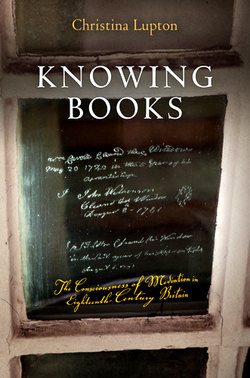Knowing Books

Реклама. ООО «ЛитРес», ИНН: 7719571260.
Оглавление
Christina Lupton. Knowing Books
Отрывок из книги
Knowing Books
Series Editors
.....
More recently, post-structuralism has given way to an emphasis on material culture that puts technologies and their objects, rather than people and ideas, at the forefront of literary investigations. Book history has introduced print production as a determinant of subjectivity and ideology, reversing the idea of books being at the service of the ideas they contain.20 Paula McDowell’s The Women of Grub Street: Press, Politics, and Gender in the London Literary Marketplace 1678–1730 (1998) and Janine Barchas’s Graphic Design, Print Culture, and the Eighteenth-Century Novel (2003) both exemplify the rewards of recovering the material aspects of eighteenth-century print communication as distinct from the ideological ones. This involves focusing on print, circulation, and the oral culture of the street in McDowell’s case, and on the frontispieces, title pages, and indexes of mid-century novels in Barchas’s. Their studies show that even texts and particular editions that seem of little interest from a narrative or generic perspective can be used to reconstruct the ways print and its associated activities of production and marketing shaped the lives of those involved in them.21
In a related vein, many recent studies of the eighteenth century have drawn on the rubric of thing theory to refashion the claim that human history might best be told from the perspective of nonhuman actors. Critics including Bill Brown, Alfred Gell, and Arjun Appadurai have built a theoretical matrix in which to think creatively about the way meaning accrues to “things.”22 Webb Keane, offering a compelling anthropological justification for making things the object of social inquiry, argues that they constitute an alternative to linguistic systems of meaning making. In the case of chairs or coats, he argues, “it is not simply that their meanings are undetermined, but also that their semiotic orientation is, in part, toward unrealized futures.”23 Things open up new versions of history that are by definition impossible to narrate as cognitive operations or intentions. For Gell, this claim comes to rest on the work of art, whose visual properties facilitate connections and meanings that language and cognition preclude.24 Such approaches shed new light on a set of correspondences, affinities, and accidents that animate material objects through forces distinct from the market.25
.....